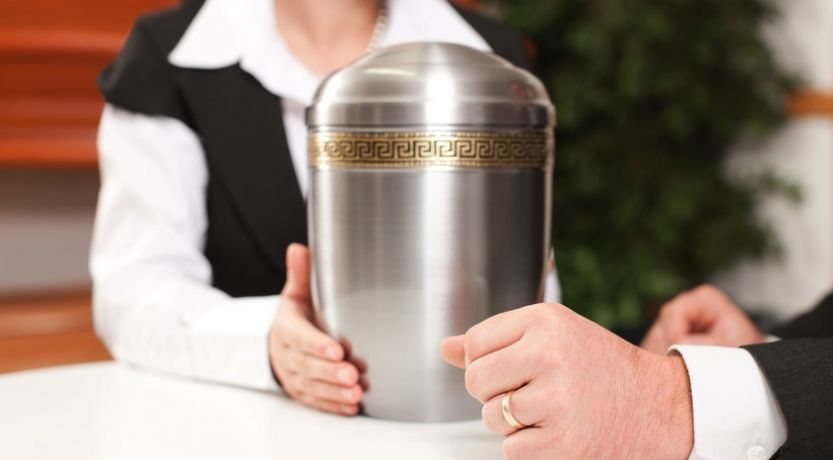When considering burial or cremation, many have wondered, What does the Bible say about cremation? Would cremation interfere with the resurrection?

Is cremation okay according to the Bible?
The Bible does not take a stance on cremation, nor does cremation in any way hamper God’s plan to one day resurrect all of humanity.
Although burning the remains of the dead is mentioned a few times in the Bible, the modern practice of cremation is not specifically addressed. One account describes a man being stoned and then burned due to his reprehensible behavior (Joshua 7:24-25). Another refers to “valiant” men who rescued and burned the remains of King Saul and his sons to prevent further dishonorable treatment of their bodies (1 Samuel 31:8-12).
The Bible neither condemns nor condones cremation
There is nothing in Scripture that indicates that the modern practice of cremation is inappropriate. Decisions on how to treat the remains of loved after death ones seem to be largely guided by the culture in which one lives.
Cremation throughout history
Following is a discussion of the subject of cremation by The International Standard Bible Encyclopedia, which illustrates how burial customs varied from culture to culture.
“Cremation, while the customary practice of the ancient Greeks, and not unknown among the Romans, was certainly not the ordinary mode of disposing of the dead among the Hebrews or other oriental peoples. Even among the Greeks, bodies were often buried without being burned (Thuc. i. 134, 6; Plato Phaedo 115 E; Plut. Lyc. xxvii). Cicero thought that burial was the more ancient practice, though among the Romans both methods were in use in his day (De leg. ii.22, 56). Lucian (De luctu xxi) expressly says that, while the Greeks burned their dead, the Persians buried them (see BURIAL, and compare 2Sa 21:12-14)” (“Cremation”).
We should add that there is nothing in the Bible to indicate that the Hebrew practice was based on God’s instructions. God simply did not decree a right or wrong about this subject. However, burial was the norm, as depicted in the valley of dry bones (Ezekiel 37). And the bones of Joseph were important enough to be maintained and carried out of Egypt. Ultimately, the fate of the wicked is to become ashes under the feet of the righteous (Malachi 4:3).
Cremation today
Clearly, cremation has become culturally acceptable in the present Western world. According to Everlife Memorials, “In 1999, there were 1,468 crematories and 595,617 cremations, a percentage of 25.39% of all deaths in the United States.” The Cremation Association of North America reported that the percentage had risen to over 34 percent by 2007.
A Religion News Service article about cremation by David Sloane said, “As late as 1970, according to figures from the Cremation Association of America, only about 5% of American chose the method. In 2020, more than 56% Americans opted for it.”
The article also noted, “The National Funeral Directors Association has predicted that by 2035, nearly 80% of Americans will opt for cremation.”
According to the Aug. 11, 2022, RNS article, the main reasons for the shift are:
“1. Funerals and ground burials are expensive . . .
“2. Environmental costs . . .
“3. Fewer Americans belong to a church . . .
“Alternatives, such as green burial, will challenge this practice, but for the foreseeable future, Americans have joined much of the world in embracing cremation.”
Some people are concerned whether cremation stems from pagan religious practices, but as previously noted, the Bible neither condemns nor condones the practice. Had it been sinful, God would have condemned it just as He did other misguided religious customs. Therefore, what believers do is entirely a matter of personal choice.
Cremation doesn’t interfere with life after death
Cremation in no way interferes with God’s ability to resurrect the dead—to give us life after death. People have died in countless ways throughout history, from accidents to warfare to being lost at sea, and yet, God will still resurrect them in the future. How can He do that without a body?
As Ecclesiastes 12:7 notes: “Then the dust will return to the earth as it was.…” All physical bodies decay after death. The verse concludes with the words, “and the spirit will return to God who gave it.” Some erroneously interpret this as a reference to righteous souls going to heaven. However, the context shows this analysis is wrong. For one thing, the verse says that the spirit of everyone who dies goes back to God who gave it. The context speaks of aging and death taking their natural course in every person. Clearly then, these verses are not speaking only of a spirit within the righteous dead going to God upon death.
What is the spirit in man? Is it an immortal soul within a physical body? It may surprise you to learn that the Bible nowhere teaches the doctrine of an immortal soul. Explore what the Bible teaches in our articles “Spirit in Man: What Is It?” and “Immortal Soul: What Is a Soul?”
Essentially, the Bible shows that the spirit in man serves as the permanent record of the deceased and by this record, God will resurrect the person at the appointed time (1 Corinthians 15:23). By way of analogy, it’s possible to recreate a destroyed building if one has the blueprints of the original. Similarly, God is able to reconstruct a person by the record preserved in the spirit in man.
So, in summary, what does the Bible say about cremation?
Therefore, cremation is an acceptable means of dealing with the dead. Cremation does not conflict with the Bible nor does it interfere with God’s ability to resurrect the dead.
Those who are considering cremation should also consider the impact of their decision on their survivors. For many people, a funeral and the ensuing interment is an opportunity to show one final act of love and respect for the deceased. Would cremation provide them with the sense of loving closure they need? Prior to making a decision to have one’s remains cremated, we recommend that people discuss these matters with family members to be sure they are also comfortable with this decision.
If you are dealing with the death of a loved one, our article “How to Deal With Grief” may help.
For more information about life after death, visit our helpful resource page.





